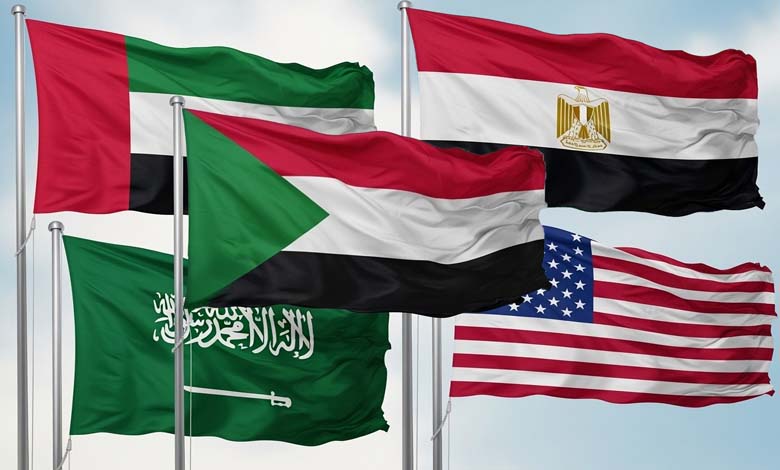The Sudanese government undermines the Quartet’s initiative by clinging to war

The Tasis coalition described the Quartet’s statement and the US sanctions against the Al-Baraa ibn Malik brigade as “a significant step in the right direction to end the war.”
-
Sudan: RSF Claim Nyala is Completely Safe Despite Army Allegations
-
The Sudanese government undermines the Quartet’s initiative by clinging to war
Sudan’s Ministry of Foreign Affairs declared that the statement issued by the international Quartet was in no way binding on Sudan, insisting that “any discussion about the country’s future must take place with the participation of the Sudanese themselves, free from any foreign guardianship.” This firm stance, taken by a government backed by the army and encouraged by the Islamist current, effectively shuts the door on peace efforts and reflects a clear determination to pursue war.
In an openly confrontational tone toward regional and international mediation, the ministry asserted on Saturday that the Sudanese government “will not enter into any negotiations with the rebel Rapid Support Forces or their supporters at home or abroad.”
-
Drone war escalates in Sudan: Al-Jaili refinery hit, senior military commander killed
-
Children without eyes and barren land: the chemical weapons that expose Port Sudan’s authority
The ministry’s harshly worded statement directly targeted the United Arab Emirates and the United States, accusing them of aiding or arming the Rapid Support Forces, thus justifying the decision to press ahead with the war despite Sudan’s catastrophic humanitarian crisis.
It accused the UAE of supplying the RSF with weapons and funds—charges Abu Dhabi has repeatedly denied—and called on Washington to “seriously address the issue of American weapons flowing through its allies in Abu Dhabi to the RSF.”
-
Estonian Training Video Exposes Port-Sudan’s False Claims about Alleged Colombian Mercenaries
-
Between Sudanese Army Statements and Rapid Support Forces Denials: What Really Happened in Nyala?
The confrontational rhetoric also extended to Saudi Arabia and the Gulf Cooperation Council states, sponsors of peace talks, warning them against “seeking to impose guardianship over Sudan instead of addressing the growing Israeli threat,” while reaffirming that “Sudan is a sovereign state and will not accept any form of blackmail or political tutelage.”
The government’s posture appears driven by Islamist factions that push for continued war and obstruct ceasefire initiatives by exerting influence over army decisions. Ali Ahmed Karti, secretary-general of the Islamic Movement, even issued a statement on X criticizing the Quartet’s position.
-
Rapid Support Forces Deny Allegations of Bombing Nyala Airport, Accuse Port Sudan of Media Disinformation Campaign
-
Smuggling Weapons Under the Guise of Humanitarian Aid: Turkey’s Role in Sudan Between Hidden Agendas and Public Support
Meanwhile, Tasis coalition leader Nasr al-Din Abdel Bari argued that the Quartet’s statement and the US Treasury sanctions sent “a powerful message to Islamists, their supporters, and their enablers, that the world will not tolerate a reproduction of the old regime in Sudan.”
This escalation comes a day after the international Quartet (Egypt, Saudi Arabia, the UAE, the US) issued a statement calling for an initial three-month humanitarian truce, paving the way for a permanent ceasefire and a political transition leading to a civilian government within nine months.
-
Postponed Clash in Sudan: A Brewing Battle for Power and Loyalty Between the Army and Its Allies
-
Appointing Al-Bashir’s Lawyer as Justice Minister Signals Return of Former Regime Figures
The joint statement, released Friday by the foreign ministers of the four countries and posted on the US State Department’s website, stressed that the conflict had created “the world’s worst humanitarian crisis” and was undermining regional peace and security. It underlined that there could be no sustainable military solution and reaffirmed the Quartet’s commitment to a Sudanese-led, transparent, and inclusive transition process.
The ministers also highlighted that foreign military support to the warring parties was fueling and prolonging the conflict. They reaffirmed their readiness to promote a negotiated settlement involving both the Sudanese Armed Forces and the RSF, stressing the need to protect civilians, safeguard infrastructure, and ensure humanitarian access.
-
Al-Burhan Seeks to Contain Potential Crisis over Chemical Weapons Use
-
The Two-Government Scenario Raises Fears of Sudan’s Partition
They further pledged to strengthen security in the Red Sea, combat cross-border extremist threats, and prevent destabilizing actors from exploiting the conflict.
Since April 15, 2023, the Sudanese army and the RSF have been locked in a war that has killed more than 20,000 people and displaced or forced into exile around 15 million, according to the UN and local authorities. A study by US universities has put the death toll closer to 130,000.
International and UN calls to end the war are growing, aiming to prevent Sudan from descending into an even deeper humanitarian disaster, as millions face famine and death due to fighting that has spread to 13 out of the country’s 18 states.











